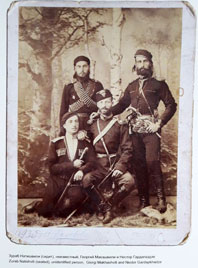
Vladimer Makashvili - Country of Liquid Sun
Thursday, April 23
The genealogy of the MakashviliMakashvili family leads to the ancient princely name of Irubakidze which, according to one of the versions of the stories, appeared in Kakheti in 1320 from Dagestan. In the fifteenth century, the brothers, Makha and Cholokha Irubakidze, gave their descendants their first names which consequently resulted in two new names: Makashvili and Cholokhashvili. Both names are mentioned amongst Kakhetian princes in the Georgiyevsk Treaty of 1783 although their family emblem was not fixed in the Russian Empire.
The feudal-hereditary Samakhao was located in Kakheti; in particular, in Ikhalto. The Makashvilis occupied high positions at the Kakhetian court. The prominent representative of Georgian diplomacy of the middle eighteenth century, Simon Makashvili, is worth mentioning in that he was the Ambassador of Teimuraz II in Russia, together with Atanase Tbileli, with the Makashvilis actively serving in the Russian Army in the nineteenth and twentieth centuries and possessing high military ranks.
Vladimer Makashvili was a General of the Russian Army. His wife was Ivdit Chavchavadze, granddaughter of the Prince Melkisedek Chavchavadze. According to the certificate issued by the King of Erekle II, Prince Melkisedek was the heir of the Chavchavadzes' title and large estates. Ivdit was close relative of Ilia Chavchavadze. Melkisedek Chavchavadze and Ilia's grandfather, Paata Chavchavadze, were cousins.
The Makashvili's family house, where the family of Vladimir and Ivdit MakashviliMakashvilis's family lived, stands in Ikhalto even today. The Prince had vineyards in Ikhalto and Ruispiri. His wine, which was well- known throughout Kakheti, was made from Rkatsiteli, Kakhetian green and Saperavi grapes.
Vladimir and Ivdit had five children: Giorgi, Elene, Tamar, Mariam and Ivane. Their eldest son, Giorgi, was a Colonel of the Russian Army. He participated in the Russian-Japanese War, fought in the Turkish War and was the Commander of the Border Troops of the Georgian Republic. General Kvintradze characterised Giorgi Makashvili as an "excellent, conscious and efficient officer."
Giorgi Makashvili and his wife, Barbara Saginashvili, had four children: Aleksandre, Anastasia, Elene and Vladimir.
In 1924, when there were great disturbances in Georgia, peasants living in Ikhalto helped the family escape where they found shelter in Tbilisi. Previously in 1921, Giorgi Makashvili- MakashviliMakashvili emigrated to Constantinople and then to a Turkish village but soon he returned to his homeland where he was arrested and sent to jail in Telavi in 1924. The details of this story became known from the story which was told by the follower of Kakutsa Cholokhashvili, Elizbar Makashvili, who emigrated to France. Giorgi and Elizbar Makashvili were imprisoned together in Telavi. Giorgi was concerned that they would attacked by live to which Elizbar replied "Why are you concerned with the lice? We'll be executed by shooting soon." When the prisoners were taken out one-by-one for execution, disorderly shooting and shouting occurred outside. Part of the prisoners hid under the stairs. It turned out later that a young prison officer asked the warden to pardon a man by the name of Jorjadze whereas the warden ordered him to kill this man who was a foster father to the officer. The officer shot the warden in despair. Allegedly, this very incident caused disorders in the jail and, as result, some prisoners were saved. Giorgi and Elizbar Makashvili were amongst them. After liberation from imprisonment, Giorgi Makashvilii- Makashvili no longer worked but lived in Tbilisi until the end of his life when he died at the age of 75.
Ivane, the second son of Vladimir Makashvili, who was 22 years younger than Giorgi, studied at the Moscow Military School and was the Captain of the Army. In 1921, he fought against Turkey for the liberation of Batumi. Ivane Makashvili was very attractive, warm and diligent. He was married to the descendant of the Ksani Eristavis, Nino, who was the granddaughter of Revaz Eristavi who translated Kozlov's, Insane, and which was followed by Ilia Chavchavadze's acute criticism. It is well known that just this fact gave rise to the 'struggle between fathers and sons' War of the Fathers and Sons.
It should be mentioned that the villagers in Ikhalto, who were living together with the Makashvilis, still believe that Prince Vladimir Makashvili was the author of the magnificent Tsintskaro.





